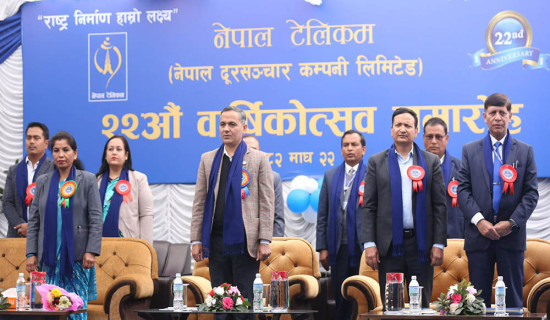- Thursday, 5 February 2026
Govt aims to double pashmina exports in five years
Lalitpur, Feb. 8: The government has introduced National Pashmina Sector Strategy 2022-2026 with a target of more than doubling the export of pashmina products in a five-year period.
The strategy aims to achieve the target of exporting pashmina worth US$ 75 million (Rs. 9.75 billion in current exchange rate) by 2026.
The strategy is formulated with the support of International Trade Centre (ITC) and EU-Nepal Trade and Investment Programme which aims at enhancing capacity of officials involved in pashmina and coffee production, and promoting the export of these two products.
Joint Secretary at the Ministry of Commerce and Supplies (MoICS) Govinda Bahadur Karki, said at a programme organised to launch the strategy in Lalitpur on Tuesday that Rs. 588 million is needed to implement the strategy where the private sector will mobilise 33.4 per cent and public sector 66.6 per cent.
Of the total goat population in Nepal, 10 per cent are Chyangra (mountain goats) from which pashmina is extracted. About 15 districts in the hills and mountains primarily Mustang, Mugu, Jumla, Dolpa and Manang are chyangra farming areas.
According to Karki, Nepal produced 4.5 million pieces of pashmina in 2019, of which 2.2 million pieces are exported worth about US$ 27.6 million.
Nepal exports pashmina mainly to UK, USA, France and Germany but export share has recently increased in Japan, Norway and Canada.
"Export of woven and knitted products have followed the world market trends with exports increasing in knitted products and decreasing in woven ones," said Karki.
Stating that export is not so encouraging, he pointed at the need of finding new international market destinations. Likewise, the subnational governments should give priority to the promotion and growth of pashmina.
Despite being the sector to receive a tremendous amount of foreign support in grants and technical cooperation compared to other exportable goods of Nepal, progress in the promotion and growth of this product is not at par with expectation, experts said.
Minister for Industry, Commerce and Supplies, Damodar Bhandari expressed his commitment to support the pashmina value chain in Nepal.
Earlier in the morning on Tuesday, he performed stone-laying of a woolen yarn processing plant, first of its type in Nepal, in Harisiddhi of Lalitpur.
"It will help in producing pashmina in Nepal and support farmers as well," he said.
The plant will complete the pashmina value chain in the country.
"Government, private sector and development agencies involved in pashmina sector have collaborated to produce this strategy and I hope they will continue to work together to develop this sector and promote export," said Minister Bhandari.
Likewise, Madhu Kumar Marasini, Secretary at the MoICS, said that there is a need to support chyangra farming in upper hills and mountains. “We should not only sell the product but also the stories behind the products like pashmina,” he suggested.
"We must promote the export of 'low volume, high value' and chyangra pashmina is one of such items. It can support in the local as well as national prosperity," he said.
Vijoy Dugar, President of Nepal Pashmina Industry Association (NPIA), said that private sector producers will be immensely benefitted from the strategy as well as the processing plant.
Dr. Ashish Shah, Director of ITC, said that pashmina has a potential to reduce rural poverty.
Quality enhancement, establishment of pashmina processing plant, increasing the competitiveness of pashmina sector, and access to niche market are the requisite to promote and enhance its export, he said.
Peteris Ustubs, European Union's INTPA Director of Middle East, Asia and Pacific, pledged EU's support to find market for Nepali pashmina in Europe.
According to him, the new strategy addresses the challenge in pashmina processing and production, enhancing quality and productivity from framers to industries.








-square-thumb.jpg)






